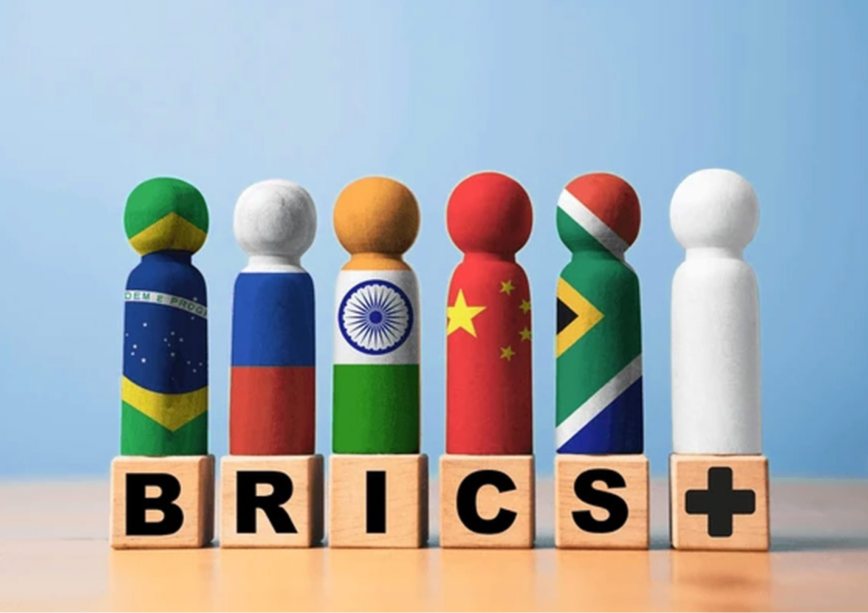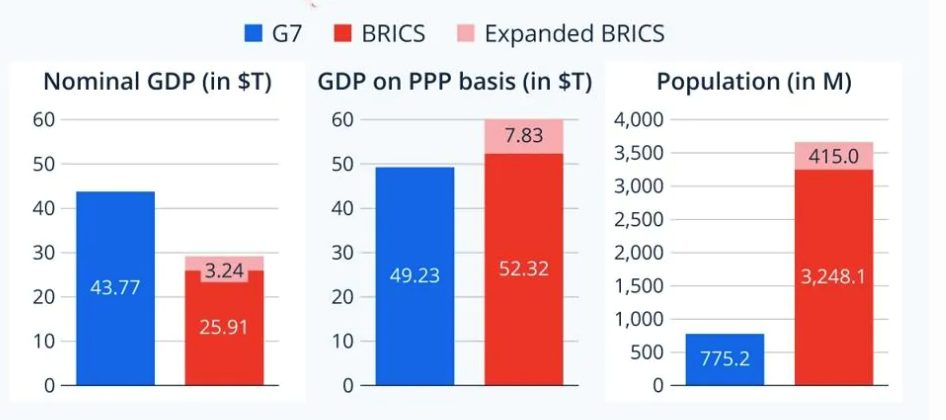-
CENTRES
Progammes & Centres
Location
The recent expansion of BRICS places it as a potential voice for the Global South in economic, trade, and investment matters

Image Source: Dilok Klaisataporn
The BRICS alliance has emerged as a dynamic force with a vision that extends beyond mere cooperation. At its core lies the ambition to establish a global economic system where nations can freely trade using their own currencies, thus reducing reliance on foreign organisations and currencies. This approach is also encapsulated in the "BRICS Plus" concept, signifying an expansion of the BRICS group to include additional member countries. The recent inclusion of Iran, Egypt, Ethiopia, Saudi Arabia, and the United Arab Emirates (UAE), from January 2024, marks a significant milestone in the evolution of BRICS.
Although Argentina was to join the expanded BRICS club as well—towards the end of 2023, it decided not to join due to a policy shift under President Javier Milei, marking a significant geopolitical move under the new leadership. The expansion now encompasses Middle Eastern oil producers and some traditional US allies. However, currently, Latin America lacks representation, particularly without Argentina. The challenge now is to draw more Latin American countries into BRICS without compromising Brazil's leadership.
The recent inclusion of Iran, Egypt, Ethiopia, Saudi Arabia, and the United Arab Emirates (UAE), from January 2024, marks a significant milestone in the evolution of BRICS.
The challenge the West faces in understanding BRICS is attributed to its diverse membership and the bloc's role in providing an alternative to the West-dominated global economic order. The BRICS expansion has attracted unprecedented international attention, transforming what was once overlooked into a significant topic of global discussion. This expansion promises enhanced economic cooperation, increased geopolitical influence, diversified perspectives, and renewed dynamism within the BRICS framework. However, it also presents challenges in aligning diverse interests and, simultaneously, opportunities for collaboration in areas such as trade and security.
Indian Prime Minister Narendra Modi expressed support for this expansion, underlining that India has always advocated for it, believing that including new members will enhance BRICS as an organisation. With BRICS representing a quarter of the world's economy and comprising some of the most powerful emerging nations, these new members are expected to shape global economic and geopolitical dynamics significantly.
Figure 1: Comparison Between the G7 and Expanded BRICS

Sources: Reuters, the World Bank
The BRICS expansion facilitates market growth by providing access to new markets and trade and investment opportunities. This potential surge in economic activity can enhance economic growth and stability within the group. Diversifying economic interests is critical in mitigating risks and creating a more resilient financial ecosystem.
Moreover, including these new members brings fresh perspectives and experiences to the table. Each country possesses unique economic strengths, challenges, and innovative approaches. The diversity within expanded BRICS enriches the economic discourse and provides opportunities for shared learning and collaboration. This diversity is an asset, encouraging a broader view of global economic issues and solutions.
The geopolitical implications of including these new members are substantial. The expansion strengthens the collective influence of BRICS on global affairs, providing a more robust platform for negotiations and decision-making regarding international economic issues. BRICS Plus, with its increased geopolitical significance, can wield greater leverage in shaping global economic policies and challenging traditional power structures.
The diversity within expanded BRICS enriches the economic discourse and provides opportunities for shared learning and collaboration.
Moreover, this expanded BRICS is better poised to address global challenges collectively. Climate change, pandemics, terrorism, and regional conflicts require a united front. The diversity and collective strength enable a more comprehensive and effective response to these challenges. It enhances the group's capacity to mediate conflicts, facilitate humanitarian aid, and promote peace and stability in regions facing turmoil.
The trade dynamics within BRICS Plus have already witnessed positive growth. China's trade with other BRICS members has expanded substantially, emphasising the economic interdependence and potential for increased cooperation within the group. This burgeoning trade activity further underscores the economic vitality of BRICS Plus and its role in fostering regional and global economic connectivity.
In essence, incorporating new members into BRICS extends its economic and geopolitical significance, offering avenues for market expansion, trade growth, and amplified influence in global financial affairs. This expansion positions BRICS as a potential voice for the Global South in economic, trade, and investment matters.
BRICS members have demonstrated solidarity, advocating for initiatives like the temporary suspension of intellectual property rules related to COVID-19 vaccines and treatments at the World Trade Organization (WTO).
Shifting focus to the BRICS response to the COVID-19 pandemic, this global crisis unleashed economic challenges, including unemployment, poverty, and inequality. In response, BRICS members have demonstrated solidarity, advocating for initiatives like the temporary suspension of intellectual property rules related to COVID-19 vaccines and treatments at the World Trade Organization (WTO). Additionally, establishing the BRICS Vaccine Research and Development Centre underscores the commitment to ensuring vaccine affordability in developing countries and greater market access for vaccines, diagnostics, and therapeutics.
While these collective efforts have been commendable, there is an acknowledgement that much work lies ahead to contain the pandemic and promote global economic recovery. The economic impact of COVID-19 was evident, with the GDP of Brazil, Russia, India, and South Africa decreasing in 2020. However, a steady recovery was observed in 2021. Faced with economic downturns, the world has witnessed increased economic nationalism and a somewhat collapse of international cooperation.
In response to these challenges, BRICS nations must strengthen macroeconomic policy coordination and multilateral cooperation to facilitate recovery. In an interdependent world, further fragmentation will only deepen global recessions and exacerbate inflation. Therefore, BRICS countries must work closely with other emerging economies and engage within frameworks such as the G20, WTO, World Bank, and International Monetary Fund to improve global economic governance. India's G20 presidency underscored the importance of representing the interests and concerns of countries from the Global South. This collaboration within influential international forums is essential for shaping policies that address developing nations' unique challenges.
As BRICS navigates these complexities, diplomatic collaboration becomes paramount, ensuring it continues evolving and finding common ground among its diverse members.
In this dynamic and ever-changing landscape, BRICS plays a pivotal role in global trade, investment, and finance. Challenges undoubtedly exist, but the collective strength and shared objectives make BRICS a platform of immense potential. As BRICS navigates these complexities, diplomatic collaboration becomes paramount, ensuring it continues evolving and finding common ground among its diverse members. Amid growing global economic tensions and the limitations of traditional multilateral institutions, BRICS stands as a focal point for discussions on economic, trade, and investment matters. Finally, the ongoing expansion reflects the increasing interest in the grouping's economic potential. However, the success or failure of BRICS hinges on its ability to align diverse economic aspirations and expectations.
Soumya Bhowmick is an Associate Fellow at the Observer Research Foundation
The views expressed above belong to the author(s). ORF research and analyses now available on Telegram! Click here to access our curated content — blogs, longforms and interviews.

Soumya Bhowmick is a Fellow and Lead, World Economies and Sustainability at the Centre for New Economic Diplomacy (CNED) at Observer Research Foundation (ORF). He ...
Read More +